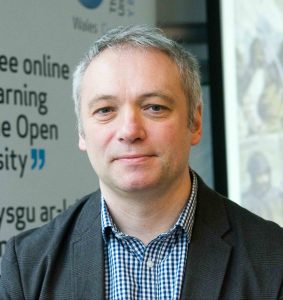In 2009, in celebration of the Open University’s 40th Anniversary, we spoke to academics across the University to predict what the future would look like in their areas of study.
Now, as we approach the OU’s 50th Anniversary, we asked the same academics to revisit their predictions, reflect on their accuracy, and reset them for the coming years; what does the Future of Education look like to them?
We spoke to Martin Weller, Professor of Educational Technology.:

Martin Weller
“I originally predicted three things:
1) A migration away from university hosted systems to third party tools hosted in the ‘cloud’.
2) The development of online identity.
3) ‘Gluing’, i.e. how we combine all these tools and resources together into a meaningful context.
While all of these have come to pass to an extent, we still currently use a central university virtual learning environment (VLE) for online courses and only make occasional use of third party tools in education. So with that in mind, I’ll be conservative in predictions, because one thing we’ve learnt is that higher education is remarkably resilient. A lot changes, while simultaneously, it seems to stay the same.
Consolidation
I think the next few years will be one of consolidation, of coming to terms with what it means for people to be online nearly all the time, with mobile devices and abundant content. The focus for education shifts to developing skills in operating in this environment, for example establishing your identity, being a good network citizen, producing online content, evaluating information, dealing with online communities, etc. These skills are relevant across all disciplines.
Blurring of Learning
While I don’t expect the standard undergraduate degree to disappear, we are seeing a blurring of it. For example, people study with open education resources (OER), or MOOCs. Universities like the OU are beginning to offer routes for recognising this learning, such as digital badges, or incorporating such content to broaden a curriculum. And this type of learning will continue past graduation, so we have a much more varied and fluid education throughout someone’s life.
Online Identity
The prediction regarding online identity is the one that has seen the most impact. At the time I failed to appreciate just how significant social media would be in society, and in many respects how potentially damaging.
What this suggests is that predicting the future is a fool’s errand, or at least that I am not very adept at it!”



